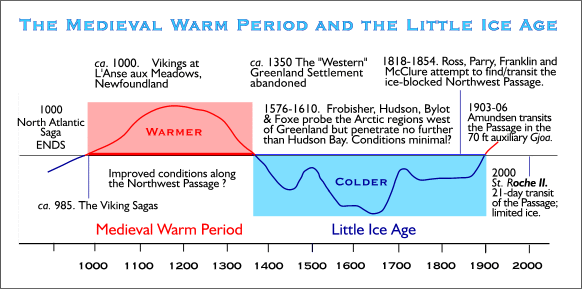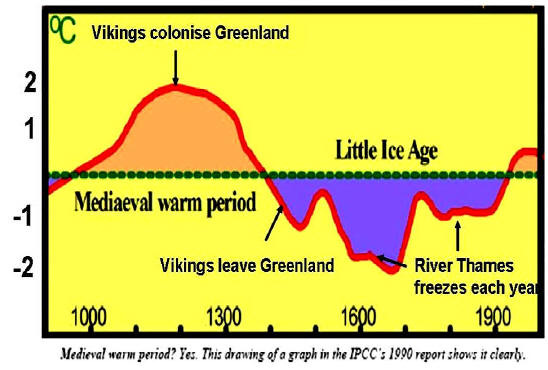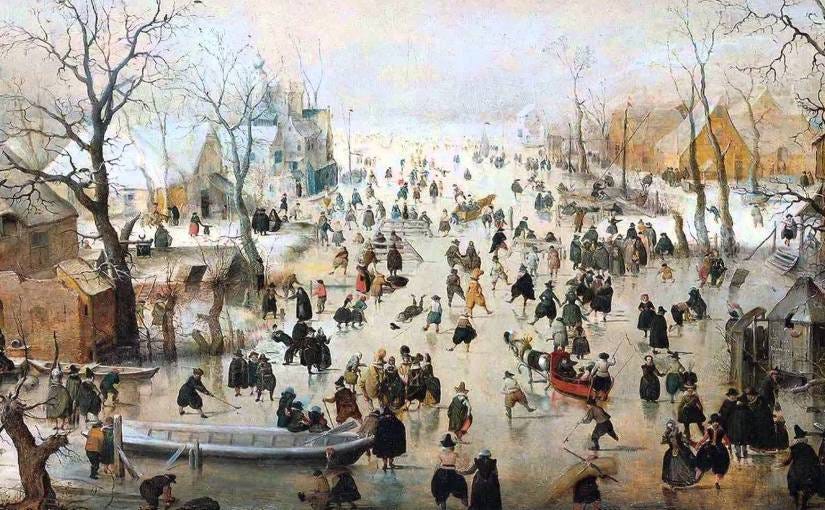Saturday, January 27, 2024
Historian Ferdinand Braudel and the long ages of ‘Climate Change’.
As Braudel states, a naturally changing climate has always impacted everything. These cyclical patterns have nothing to do with human activity, but certainly impact and inform human civilisation.
by StFerdIII
Purpose
The purpose of this post is to put ‘climate’ in a historical perspective by citing one of Western Civ’s greatest historians – Ferdinand Braudel. In the frenzied false science of ‘Climate Change’ funded by endless billions in propaganda, fake studies, temperature rewriting, and Winston Smith ‘newspeak’ where the past is cut out and replaced by a corrupt present-day rendering of mendacious falsity, reading real unvarnished history and truth is not only a delight, but an anodyne. Braudel in his assessment of our civilisation discusses the natural and normal cycles of history, anathema to the religious within the Church of Climate.
As previous posts have articulated, there is no ‘Climate Crisis’ and the imposition of grotesque and deforming technologies such as Solar, EV’s and the infamous Bird Choppers do the opposite of what the billionaire global class claims. They are not cheaper, more productive, nor are they Gaia friendly. Based on this reality we know that Net Zero and all associated climate policies are a fraud premised on the false claims that plant food at 400 parts per million controls climate and that ‘climate’ has never changed or been disrupted in the past.
The risible idiocy of these claims is painful to those with balanced perspectives and a knowledgeable intelligence. No matter how inane they are, these fantasies, fuelled by endless streams of money, and now accepted as religious orthodoxy, must be fought, overturned, and burned. The only true crisis we have is the deconstruction of Western Civilisation along every vector, and the creation of a Federated New World Order tyranny. Climate fascism is a part of that process.
A real historian
Ferdinand Braudel (1902-1985) is one of the most remarkable historians in Western history but is rarely if ever taught in university. His name is largely unknown. There is a reason for this. Today he would be labelled a ‘conservative’, a ‘denier’ of some rewritten historical truth as defined by modern academia, an ‘extremist’ in that he defended the attributes and medieval heritage and foundations of Western Civilisation.
Braudel eschewed the deranged anti-Western Marxist rewriting of history with its slavish fascination with communalism, totalitarianism; and a-scientific cults posing as religions-of-truth. He had the unfortunate character trait of being honest and assessing facts in a direct and straightforward manner. He possessed the derided capacity to identify the innumerable minutia which led to the creation of modern civilization, a complexity lost on the modern world with its 5-minute attention span and Braudel had the rather the unique capability of weaving such details into a story. Not only was he a clear headed realist historian, he wrote history as a novel – compelling, structured, with organised and lucid themes.
In today’s Orwellian dystopian view and virtual reality, Braudel is simply a thought-criminal and purposefully ignored by the gatekeepers in education and the media. Given that Braudel is the greatest historian of the 20th century we can classify this censorship as criminal. For those who desire a real record of history this is precisely why he should be studied (a list of Braudel’s books are provided at the end of the post)
.
Braudel and Climate
Though ostracized by the liberal-socialist educational system, the Frenchman Braudel, with his ‘longue-durée’ [long view] concept of historical processes is a remarkably thorough, accessible, and relevant narrator. In one of his masterpieces, ‘The Structures of Everyday Life’, Braudel recounts how climactic cycles and a naturally changing climate has impacted the development of modern capitalism and our civilisation. He would never dare to introduce the satanic fraud of Co2 as a toxin, or the fictitious ‘greenhouse effect’ (the Earth is an open, not a closed system).
The Structures of Everyday Life is the first volume of three in Braudel’s opus on modern capitalism. He paints a portrait of society at the common, everyday level. How did people live? What tools did they use? Where did the tools come from? How and where were they invented? What metals, agriculture, industry and manufactures were in evidence during the period? How did they develop from past periods? What were the houses, water, and food quality like? How open was trade and the exchange of ideas? What requirements and factors driving innovation led to ‘revolutionary’ irruptions in agriculture, business, and war?
There is no ante- or neo- Marxian analysis in Braudel’s work. He does not apologize for capitalism, trade, prosperity, the conflicts of culture, or the preoccupations of war and enterprise. He simply discusses how events transpired, what processes and inputs were evident in the creation of the modern world economy, and why certain results were achieved. He puzzles for example on the Mongol capture of Russia and parts of Eastern Europe which forever changed the course of Russian history; how and why the English in the 17th century created coke smelting and not the Chinese who knew of coal and furnace blasts 18 centuries earlier; or the impact on European development between 1400 and 1700 from a greatly cooling global climate.
The original human sin of issuing emissions from carbon products does not make an entrance into Braudel’s analysis, because such faux-religious ideals have no place in real history.
1400-1700 and the Climate
On page 48 Braudel asks a key question in trying to understand why, between 1400 and 1700, human developments across the globe seemed to move together in many ways. From China to North America changes in society, culture, warring, economics, exploration, and trade can be seen as moving essentially in the same direction.
‘The real question is: why did these phenomena occur at the same time throughout the world when the space [he means land] had always been available? The simultaneity is the problem. The international economy, effective but so fragile, cannot assume sole responsibility for such a general and powerful movement. It too is as much consequence as cause.’
Indeed. What forced political-economic development in the early modern capitalist period between 1400 and 1700 was as Braudel states, due in part to natural cycles of climate change.
‘One can only imagine one single general answer to this almost complete coincidence: changes in climate.’
The change in the world’s climate over this three-hundred-year period affected everything from rainfall to agricultural output, to the levels of rivers and seas, to the migrations of people, to the opening and closing of trade routes. As the earth noticeably cooled during this period the term ‘the little ice age’ was coined. It was a global phenomenon and probably lasted longer than 300 years stretching in many locations into the 19th century. Co2 emissions were apparently not a factor in this climate transformation.
In an epoch where 90% of the population was agricultural peasantry, a shift in climate provoked wide ranging societal change. Harvests and social rhythms depended on a stable climate. In the 14th century there began a general cooling of the world’s temperature. Glaciers and ice sheets advanced. The Vikings were cut off from Greenland by large ice floes. Corn, needing longer to grow than wheat, could not be harvested leading to yearly famines across much of Europe. Peasant uprisings in the 16th and 17th centuries became common as harvests failed. Droughts brought on plagues, locusts and more famines in China and Asia. Mankind was under siege from nature.
Climate’s impact on foodstuffs had enormous consequences on the rest of society. The prices of various products, and society’s general wealth were quite dependent on the cycles of nature in the early modern period. Until the late 18th century, man was still a slave to the calendar and to nature’s whims.
Writing in the 1980s Braudel cautioned that climate cycles are incredibly complicated and cannot be oversimplified.
‘But we would also do well not to forget the damage inflicted by the drought of 1976 in France and Western Europe, or the abnormal change in wind patterns which caused catastrophic drought east of the Rocky Mountains…in 1964.’
Certainly. We can add snow in London in July of 1976, or in Moscow in July of 2003, or in North Africa in 2006, or the worst winter on record in 2003 in Eastern Europe, or the highest snowfall on record during 2007 in parts of Canada and the US, early and severe winters in 2023 and 2024 in various parts of Europe and Asia, the impact of El Nino (a process we don’t understand) and undersea volcanic activity to induce some above average warmth in parts of the globe during the summer of 2023, along with an inexhaustible list of climatic and weather events in the past 150 years which are delinked from mankind’s activities. Were the record hot temperatures of the 1880s and 1930s induced by mankind’s industrial output to be followed by the cooling scare of 1945-1975, or were they simply natural cycles? Braudel rightly emphasises nature’s sudden and dramatic shift in climate and temperature.
Impacts of Natural Cycles
In the early modern period, there was a rush of activity in addition to the usual list of famines, uprisings and plagues. Between 1400 and 1700 agricultural reforms, the improved use of husbandry and new techniques in labour division, production, and capital formation presaged the English industrial revolution of the mid-18th century. Trade increased, ideas were exchanged and innovations in shipping and transport started the formation of the modern form of globalization in trade and commerce we recognize today. The Dutch, through the creation of limited companies, began the process of modern capital formation so important to the modern political economy. As Braudel states there is a deliberate pattern of change before a so-called revolution is allowed to appear.
But climate was vital. All sorts of empires and epochs have been affected by climate change in times past as remarked upon by Braudel. The Bronze Age empires of 1200 BC including the Mycenaean, Minoan and Hittite literally disappeared over night most likely due to a global catastrophe, perhaps induced by a cosmic incident. Drought, famine, destroyed water supply and emptied the large Hittite centers of their populations. The Roman empire experienced climate upheaval many times, which impacted agriculture, taxation, and ultimately the ability to sustain large enough armies to protect its ever-expanding borders.
Climate is not stable, linear, nor is it predictable (the heretics Velikovsky and Cuvier provided extensive proofs of natural climate catastrophe). Climate change is natural and it can be vicious and unkind.
Patterns, Patterns, Patterns
(Link - the above graph shows the Alley et al reconstruction of the GISP2 Greenland ice core temperature record. There is no ‘warming’ of anything in Greenland when viewed in Braudel’s long duration of history)
This is a most important lesson from reading Braudel’s work. Climatic patterns, which seem to us so personal and close today, have been of course the centre of human experience forever and they impact civilisation’s development in every sphere of activity. We don’t understand natural climate patterns, nor can we explain why between 1400 and 1700 (or 1800 in many regions), we had a little ice age, and why between 1945 and 1975 we experienced cooling temperatures. We can’t explain what caused the devastation of the Hittites, nor why ancient Rome went through climactic upheavals which shook the foundations of the state and changed the very nature of the Roman system including which colonies were won or lost.
But historical perspective and endless repeating climate cycles seem irrelevant in a world of sound bites. The maudlin predations of today’s eco-prophets are predictably premised on power, regulatory control and money. The ravings and fraud of the eco-cult have however, little basis in anything other than stupidity. Climate change has always existed and Co2 emissions have nothing to do with natural cycles and climatic derangement. Given that Gaia emits 95% of the trace chemical plant food, logic dictates that Co2 levels must follow natural climatic patterns and shifts. Claiming otherwise violates real science including Planck’s laws, how light wave infrared radiation operates, and the cycles of climate and element production and recycling.
Bottom Line
The eternal narcissism and corruption of humans, along with the insatiable lust for power and control, makes debating a topic such as climate change problematic. It is never about facts or reality. It is always an emotive ejaculation with the cult of ‘science’ who have demanded since 1988 to ‘act now!’ to save Mother Earth or propitiate this and that demand of the earth goddess. It is hardly an intelligent way to carry on. Maybe taking a long view of history, processes and issues might help society restore some sanity.
The cleanest societies in the world, are the richest, the most technologically advanced and the most democratic. If you don’t believe that, then take a tour of the former Soviet Union, Latin America, China, or Africa. Why anyone would want to impair modern development to satiate a Globalist-Marxist cult is truly unfathomable but entirely expected in a world where a woman cannot be defined, the shrew became you, and Corona fascism is applauded as health and safety.
=====
Related material
Wesseling, H. (1981). ‘Fernand Braudel, Historian Of The ‘Longue Durée’. Itinerario, 5(2), 15-29. https://cambridge.org/core/journals/itinerario/article/fernand-braudel-historian-of-the-longue-duree/110770082a744b2713db4e3bd74e2bcb
Easterbrook, Don J. Professor of Geology, Western Washington Univ, Bellingham, WA, The past is the key to the future: Temperature history of the past 10,000 years Link
The works of Braudel.
The first three listed below are really ‘must reads’, though they are long and dense. A definitive and accessible one-volume summary of Braudel’s extensive writing awaits an ambitious student of history.
Civilization and Capitalism, 15th–18th Century, 3 vols. (1979, translated by Siân Reynolds)
vol. 1: The Structures of Everyday Life
vol. 2: The Wheels of Commerce
vol. 3: The Perspective of the World
The Mediterranean in the Ancient World (UK) / Memory and the Mediterranean (US; both 2001, translated by Siân Reynolds)
A History of Civilizations (1995, translated by Richard Mayne)
Out of Italy, 1450–1650 (1991, translated by Siân Reynolds)
The Mediterranean and the Mediterranean World in the Age of Philip II. 2 vols. (1972 and 1973, translated by Siân Reynolds)
On History (1980, translated by Sarah Matthews)
The Identity of France, 2 vols. (1988–1990, translated by Siân Reynolds)
vol. 1: History and Environment
vol. 2: People and Production



